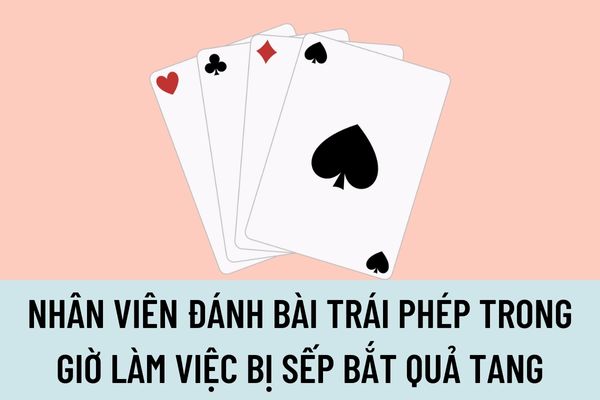Employee caught gambling illegally during working hours by the boss, does the boss have the authority to impose disciplinary dismissal?
Is an employee who gambles illegally at the workplace subjected to disciplinary dismissal?
Simultaneously, as stipulated in Clause 1 Article 125 of the Labor Code 2019:
Application of disciplinary dismissal form
The form of disciplinary dismissal is applied by the employer in the following cases:
1. The employee commits acts of theft, embezzlement, gambling, intentionally causing injury, or using drugs at the workplace;
2. The employee discloses business secrets, technology secrets, infringes on the intellectual property rights of the employer, engages in acts causing serious damage or threatening to cause especially serious damage to the property, interests of the employer, or sexually harasses at the workplace as stipulated in the labor regulations;
3. The employee who is disciplined with extended promotion time or demotion and repeats the violation during the non-expunged disciplinary period. Repetition is the case where the employee repeats a violation that has been disciplined but the discipline has not been expunged according to Article 126 of this Code;
4. The employee arbitrarily leaves work for 05 accumulated days within 30 days or 20 accumulated days within 365 days from the first day of unauthorized leave without legitimate reasons.
Cases considered to have legitimate reasons include natural disasters, fires, illness of oneself or relatives with a certification from a competent medical authority, and other cases specified in the labor regulations.
In cases where an employee commits illegal gambling during working hours, it falls under the scenario subject to disciplinary dismissal.
Therefore, if an employee is found by their superior to be gambling during working hours, the superior has the right to dismiss the employee for the violation.

Employee caught gambling illegally during working hours: does the superior have the right to dismiss?
What forms of gambling are considered illegal gambling?
According to the provisions of Article 28 of Decree 144/2021/ND-CP regarding forms of illegal gambling include:
- Purchasing lottery numbers, lottery tickets.
- Illegal gambling in various forms such as xoc dia, ta la, to tom, tu lo kho, tam cuc, three trees, four colors, red-black, chess puzzles, Indian card games with 6 cards, gray gold card game with 13 cards, 13-card Tien len, cockfighting, tai xiu betting or other forms aimed at winning or losing money, property, items.
- Illegal gambling using machines or electronic games.
- Illegal betting in sports, entertainment activities, or other activities.
How will employees engaged in illegal gambling during work hours be sanctioned?
According to the provisions of Article 28 of Decree 144/2021/ND-CP, it is stipulated as follows:
Illegal gambling behavior
1. A fine ranging from 200,000 VND to 500,000 VND for the act of purchasing lottery numbers or lottery tickets.
2. A fine ranging from 1,000,000 VND to 2,000,000 VND for one of the following acts:
a) Illegal gambling in various forms such as xoc dia, ta la, to tom, tu lo kho, tam cuc, three trees, four colors, red-black, chess puzzles, Indian card games with 6 cards, gray gold card game with 13 cards, 13-card Tien len, cockfighting, tai xiu betting or other forms aimed at winning or losing money, property, items;
b) Illegal gambling using machines or electronic games;
c) Illegal betting in sports, entertainment activities, or other activities.
3. A fine ranging from 2,000,000 VND to 5,000,000 VND for one of the following acts:
a) Receiving deposits, pawning, or illegal lending at gambling venues, other gambling places;
b) Selling lottery numbers, lottery sheets, related publications for lotteries; forwarding to others for commission;
c) Assisting or concealing illegal gambling activities;
d) Guarding illegal gambling spots;
e) Owners, managers of electronic game machines, business establishment owners, managers of electronic game establishments or other trade, service establishments who show leniency leading to illegal gambling activities on their properties.
4. A fine ranging from 5,000,000 VND to 10,000,000 VND for organizing gambling activities as follows:
a) Inciting, enticing, gathering others for illegal gambling activities;
b) Using one's house, accommodation, means, other locations they own or manage to permit illegal gambling;
c) Placing illegal gambling machines or electronic games;
d) Organizing illegal monetary betting activities.
5. A fine ranging from 10,000,000 VND to 20,000,000 VND for organizing the following illegal lottery activities:
a) Being the owner of the lottery;
b) Organizing the production, issuance of lottery sheets, related publications for lotteries;
c) Organizing a network of selling lottery numbers or lottery tickets;
d) Organizing betting in physical sports, entertainment activities, or other activities to gamble and win money.
6. Additional penalties:
a) Confiscation of materials, administrative violation means for acts as prescribed in Clause 1; Clause 2; points a and b Clause 3; points b, c, and d Clause 4 and Clause 5 of this Article;
b) Suspension of activities for 06 to 12 months for acts prescribed at point e Clause 3 of this Article;
c) Expulsion of foreigners who commit administrative violations as prescribed in Clauses 1, 2, 3, 4, and 5 of this Article.
7. Remedial measures:
Mandatory to remit illegal profits obtained by committing violations prescribed in Clause 1; Clause 2; points a and b Clause 3; points b, c, and d Clause 4, and Clause 5 of this Article.
An employee's act of illegal gambling will be administratively fined from 1,000,000 VND to 2,000,000 VND.
In addition, acts like inciting, enticing, gathering people for illegal gambling will be fined from 5,000,000 VND to 10,000,000 VND.
Additionally, if the employee engages in illegal gambling at the workplace, supplementary sanctions will be applied such as confiscation of materials and administrative violation means.
Additionally, remedial measures involve mandatory remittance of illegal profits obtained from the violation.
LawNet
